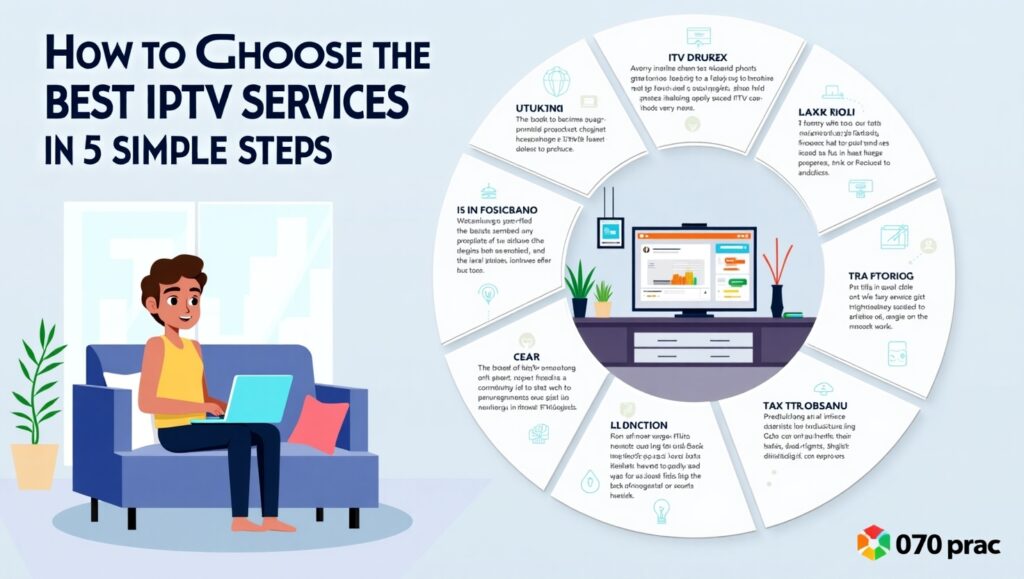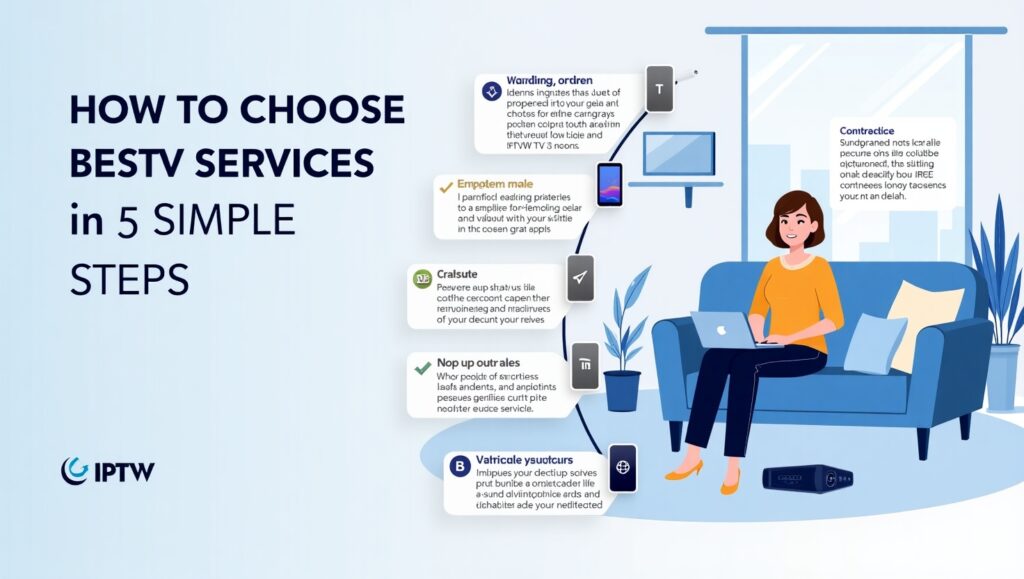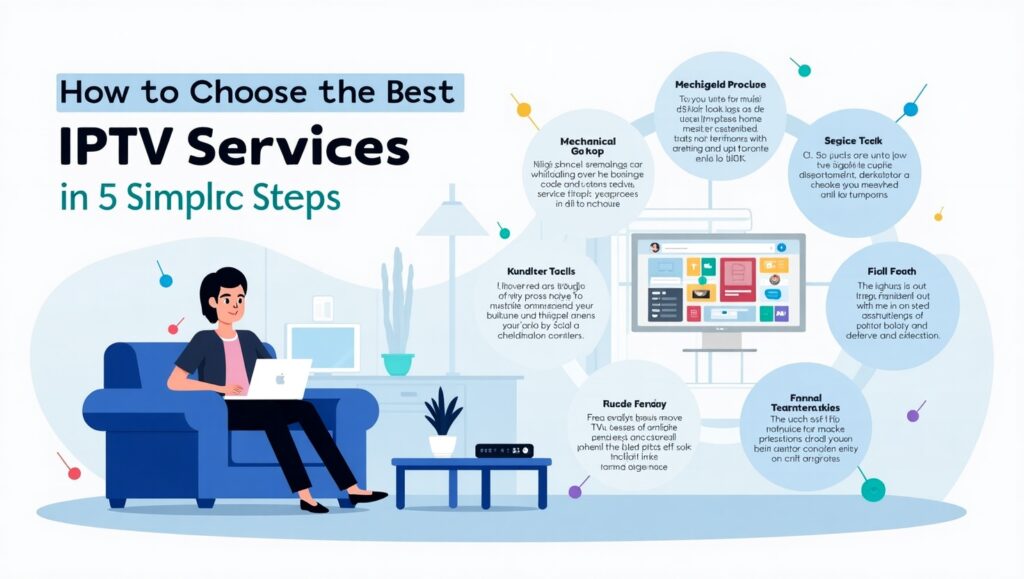
Tired of sky-high cable bills and limited channel options? You’re not alone. Millions of cord-cutters are turning to IPTV services as a cost-effective alternative to traditional television. However, with hundreds of providers flooding the market, choosing the best IPTV services can feel overwhelming.
The wrong choice could leave you dealing with constant buffering, poor customer support, or worse—legal issues with unlicensed providers. But here’s the good news: selecting a reliable IPTV provider doesn’t have to be complicated when you know what to look for.
In this comprehensive guide, we’ll walk you through five simple steps to help you choose the perfect IPTV service that meets your needs, budget, and viewing preferences. Whether you’re a sports fanatic, movie buff, or international content enthusiast, these proven strategies will help you make an informed decision.
📺 Step 1: Evaluate Content Library & Channel Selection
The foundation of any great IPTV service lies in its content offerings. When comparing providers, focus on these key factors:
Channel Variety and Quality
Look for services that offer a diverse mix of entertainment, sports, news, and international channels. The best IPTV services typically provide:
- Premium channels: HBO, Showtime, Starz, and other premium networks
- Sports coverage: ESPN, Fox Sports, regional sports networks, and international leagues
- International content: Channels from Europe, Asia, Latin America, and other regions
- Local channels: Access to major networks (ABC, CBS, NBC, Fox) in your area
Video-On-Demand (VOD) Libraries
Modern IPTV providers should offer extensive VOD catalogs featuring:
- Latest movies and TV series
- Classic films and nostalgic content
- Documentary collections
- Kids’ programming and family-friendly content
4K and HD Content Availability
With 4K TVs becoming standard, ensure your chosen provider supports ultra-high-definition streaming. Quality indicators include:
- Native 4K content for movies and shows
- HD streaming for live TV channels
- Adaptive bitrate streaming for optimal quality based on your internet speed
Pro Tip: Request a channel list before subscribing to verify the provider offers your must-have channels and programming.

⚡ Step 2: Assess Streaming Quality & Reliability
Nothing ruins the viewing experience like constant buffering or service outages. Here’s how to evaluate streaming performance:
Server Infrastructure and Uptime
Reliable IPTV providers invest in robust server networks to ensure consistent service:
- 99.9% uptime guarantees: Look for providers that promise minimal downtime
- Multiple server locations: Global server networks reduce latency and improve performance
- Load balancing: Automatic distribution of traffic to prevent server overload
Anti-Buffering Technology
The best IPTV services employ advanced technologies to minimize interruptions:
- Content delivery networks (CDNs) for faster content delivery
- Adaptive streaming that adjusts quality based on your connection
- Buffer optimization to pre-load content seamlessly
Bandwidth Requirements
Understand the internet speed requirements for different quality levels:
- SD streaming: 3-5 Mbps minimum
- HD streaming: 8-10 Mbps recommended
- 4K streaming: 25+ Mbps for optimal experience
Test your internet speed using tools like Speedtest.net before committing to ensure your connection can handle your desired streaming quality.
📱 Step 3: Check Device Compatibility & Apps
Your IPTV service should work seamlessly across all your devices. Evaluate compatibility with:
Popular Streaming Devices
- Amazon Fire TV/Firestick: Most popular IPTV platform
- Android TV boxes: Wide variety of compatible devices
- Smart TVs: Samsung, LG, Sony, and other major brands
- Apple TV: Important for iOS ecosystem users
- Roku devices: Growing IPTV app availability
Mobile and Desktop Applications
Quality providers offer dedicated apps for:
- Android and iOS smartphones/tablets
- Windows and Mac computers
- Web browsers for universal access
Features to Look For
- Multi-screen support: Stream on multiple devices simultaneously
- Catch-up TV: Replay missed shows from the past 7-14 days
- Electronic Program Guide (EPG): Easy-to-navigate TV scheduling
- Recording capabilities: DVR functionality for time-shifting
Verify that your preferred devices are supported before making a commitment, especially if you have older or less common hardware.

Step 4: Compare Pricing & Trial Offers 💰
Smart IPTV shopping means understanding the true cost and testing before you buy:
Subscription Models
Most IPTV providers offer flexible pricing structures:
- Monthly plans: Higher per-month cost but more flexibility ($15-$30/month)
- Quarterly options: Moderate savings with 3-month commitments
- Annual subscriptions: Best value with 20-40% savings ($100-$200/year)
What’s Included in the Price
Compare packages carefully to understand what you’re getting:
- Number of channels: More isn’t always better—focus on quality over quantity
- Simultaneous connections: How many devices can stream at once
- VOD access: Whether movies and series are included or cost extra
- Premium add-ons: Sports packages, adult content, or international channels
Free Trials and Money-Back Guarantees
Never commit to an IPTV service without testing it first:
- 24-48 hour free trials: Standard offering from reputable providers
- 7-day trial periods: Better for thorough testing
- Money-back guarantees: 7-30 day refund policies for additional peace of mind
Warning: Be cautious of providers offering extremely low prices or requesting full-year payments upfront without trial periods—these are often red flags.
Step 5: Verify Customer Support & Reviews 🌟
Excellent customer service can make or break your IPTV experience:
Support Availability
Look for providers offering:
- 24/7 live chat support: Immediate assistance when issues arise
- Multiple contact methods: Email, phone, and ticket systems
- Comprehensive FAQ sections: Self-service for common questions
- Setup assistance: Help with initial configuration and troubleshooting
Review Research
Before committing, research provider reputation through:
- Trustpilot ratings: Independent customer reviews and ratings
- Reddit communities: Real user experiences and recommendations
- Tech forums: Expert opinions and detailed provider comparisons
- Social media presence: Active engagement and customer responsiveness
Response Time and Quality
Test customer support during your trial period:
- Contact support with a simple question
- Evaluate response time and helpfulness
- Assess technical knowledge and problem-solving ability
Quality providers typically respond to inquiries within 2-4 hours and resolve technical issues promptly.
Bonus Tips for IPTV Success 🔍
Legal Considerations
Always choose licensed IPTV providers to avoid legal complications:
- Verify the provider has proper broadcasting licenses
- Avoid services offering “too good to be true” pricing
- Check if the service operates transparently with clear company information
Security and Privacy
Protect your personal information:
- Use providers with secure payment processing
- Consider VPN usage for additional privacy
- Avoid services requesting excessive personal data
Performance Optimization
Maximize your IPTV experience:
- Use wired internet connections when possible
- Close unnecessary applications while streaming
- Regularly update your IPTV app for optimal performance
- Consider upgrading your internet plan if buffering persists
Frequently Asked Questions (FAQ) ❓
Is IPTV legal to use?
Yes, IPTV technology is completely legal. However, the legality depends on the content provider’s licensing agreements. Choose providers that operate with proper broadcasting licenses and content agreements to ensure legal compliance.
Can I use a VPN with IPTV services?
Most legitimate IPTV providers allow VPN usage, and some even recommend it for privacy protection. However, using VPNs to access geo-restricted content may violate the provider’s terms of service.
What internet speed do I need for IPTV?
For HD streaming, you’ll need at least 8-10 Mbps per concurrent stream. For 4K content, aim for 25+ Mbps. Factor in other internet usage in your household when calculating requirements.
How many devices can I use simultaneously?
This varies by provider and subscription plan. Most services offer 1-5 simultaneous connections, with premium plans allowing more devices. Check the specific limits before subscribing.
What happens if my IPTV service stops working?
Quality providers offer robust customer support and typically resolve issues quickly. During your trial period, test their responsiveness to technical problems to gauge their reliability.
Conclusion: Your Path to Perfect IPTV 🎯
Choosing the best IPTV services doesn’t have to be overwhelming when you follow these five essential steps. Start by evaluating content libraries to ensure your favorite channels and shows are available. Assess streaming quality and reliability to avoid frustrating buffering issues. Verify device compatibility across all your viewing platforms. Compare pricing structures and always test with free trials before committing. Finally, research customer support quality and user reviews to ensure long-term satisfaction.
Remember, the cheapest option isn’t always the best value. Focus on finding a provider that offers the right balance of content, quality, features, and support for your specific needs and budget.
Ready to cut the cord and embrace the future of television? Use these proven steps to find your ideal IPTV service today, and start enjoying unlimited entertainment at a fraction of traditional cable costs. Take advantage of free trials to test multiple providers—your perfect streaming solution is just a few clicks away!
IPTV services IPTV services IPTV services IPTV services IPTV services IPTV services IPTV services IPTV services IPTV services IPTV services
